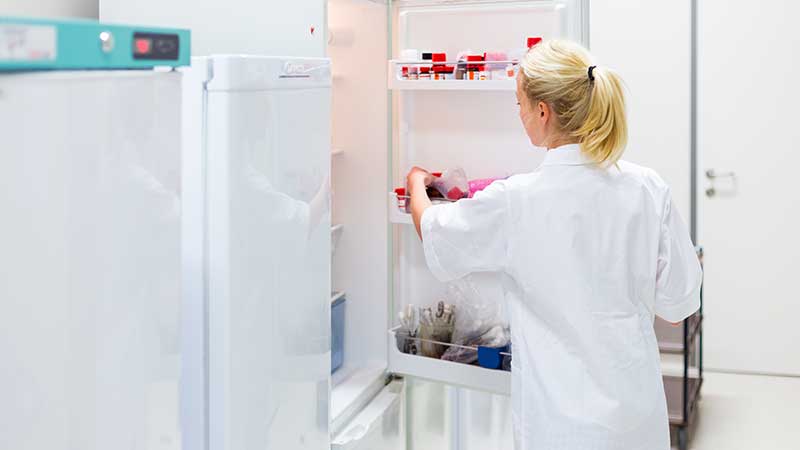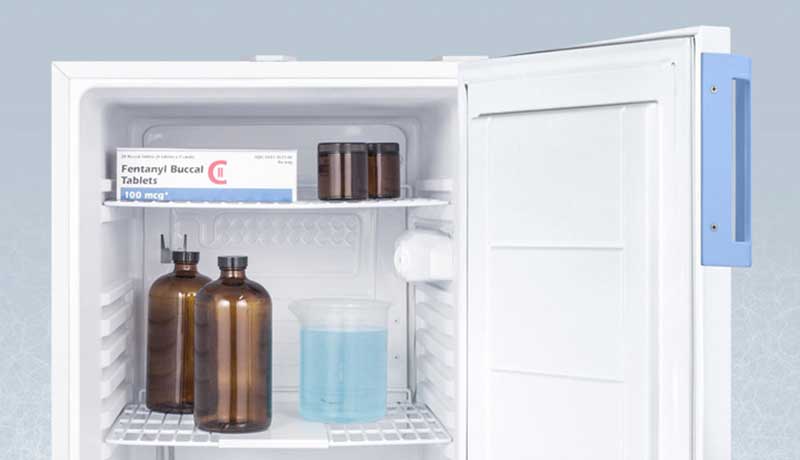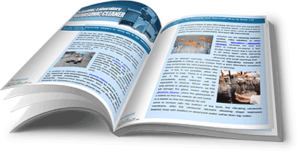Lab Refrigerator
Laboratory Refrigerator Selection Criteria
A laboratory refrigerator or freezer plays a critical role in healthcare facilities, universities, pharmaceutical and medical device manufacturing, and law enforcement. Vaccines, pharmaceuticals, blood samples, plasma, biological specimens and other temperature-sensitive products should not be stored in residential and commercial units.
Proper storage of temperature-sensitive products is governed by organizations such as the Food and Drug Administration and the Centers for Disease Control and Prevention. Pharmaceutical and medical device manufacturers provide recommended storage temperatures for their products.
Why Laboratory Refrigerator Systems are Critical
- Improper storage of vaccines results in loss of potency and the expense of re-vaccination.
- Storing valuable or irreplaceable biological specimens is another example where proper temperature control is critical.
- Replacement costs and potential penalties due to improper storage justify investments in scientific laboratory refrigerators and freezers.
This post covers criteria to consider when specifying your laboratory refrigeration equipment.
Lab Refrigerator and Freezer Categories
Let’s start with … Read the rest
Specification Guidelines for Medical Refrigerators
Medical refrigerators – also called laboratory and scientific refrigerators – employed across healthcare and research facilities can be broadly classified into three categories:
- Medical refrigerators – operating at temperatures between 35⁰ and 46⁰F (2⁰ and 8⁰C)
- Medical freezers – operating at a temperature range of -4⁰ to -31⁰F (-20⁰ to -35⁰C)
- Ultra low temperature freezers with a temperature range of -58⁰ to -123⁰F (-50⁰ to -86⁰C)
Temperatures shown are examples. Temperature capability is indicated on manufacturers’ spec sheets. What’s important for you is selecting a medical refrigerator system that conforms to guidelines established by government and professional associations.
Note that household or commercial-grade units are not recommended for medical refrigeration as they are unable, for example, to maintain temperatures to exacting standards.
Costs of Improper Storage
As one example, improper storage, malfunctioning equipment, human error, and power failures annually cause thousands of dollars in losses due to compromised vaccines. … Read the rest
CDC Refrigeration Guidelines for Submitting COVID-19 Specimens for Testing
While the search for a Coronavirus vaccine proceeds at full throttle a crucial issue is proper collection, labeling, storage and shipping of COVID-19 specimens to CDC laboratories for testing. Among procedures spelled out in the CDC’s Interim Guidelines is that coronavirus specimen shipments must be stored at 2-8⁰C and shipped overnight on icepack for testing within 72 hours. If a delay in shipping is expected, specimens must be stored at -70⁰C or lower. These agree with a companion guideline for post-mortem testing.
Temperature Guidelines for COVID-19 Test Kits
Because there are so many sites collecting specimens there is a national shortage of reagents for the tests. Test kits are available for real-time PCR and in vitro diagnostic procedures. One manufacturer specifies storage temperatures from -10⁰ to -30⁰C down to ≤-70⁰C depending on the components of the kits.
To meet these storage requirements you should be familiar with
- Scientific Refrigerators
- Scientific Freezers
How to Specify a Compact Medical Refrigerator
Health care clinics must exercise care when selecting a compact medical refrigerator to store temperature-sensitive products such as vaccines and other pharmaceuticals. A compact medical refrigerator is a smart choice when space is at a premium, but a small size should not be at the cost of critical features that protect contents. This post provides tips on how to specify a compact medical refrigerator.
Why a Medical Refrigerator is Important
If there is temptation to buy a dormitory or residential-grade refrigerator it must be resisted. In fact, the former is definitely ruled against in the CDC’s Vaccine Storage and Handling Toolkit while the latter may be acceptable under certain conditions. We encourage you to download and review these guidelines, updated for 2020 before you decide on your medical refrigerator.
Especially important is compliance with CDC and Vaccines for Children refrigeration guidelines if your healthcare facility participates in these programs.
The “Cost”
… Read the restSpecify a Pass-Through Industrial Refrigerator
Pass through industrial refrigerators are preferred cold-storage units for applications where convenience and/or content protection is desired when transferring contents between one location and another. As the name suggests these refrigerators allow access from the front and back for stocking and removal of their contents. In this post we describe to buyers important tips on how to specify a pass-through industrial refrigerator.
But first…….
Do you Need a Pass-Through Industrial Refrigerator?
In many instances they can simplify handling and storage and enhance workflow.
For example, in a typical scenario a pass-through refrigerator is used to permit products to be stocked from the back and removed from the front. This feature supports a “first-in-first-out” inventory control system as stockers move the older product forward to minimize loss due to expiration or use-by dates.
Pass-through refrigerators can also serve as a temperature-controlled “boundary” between separate facility functions such as separating a clean … Read the rest
How to Safely Store Vaccines for the Flu Season
With the 2019-2020 flu season upon us it’s time for healthcare facilities to take a close look at their refrigeration equipment for vaccine storage and temperature monitoring. The CDC has published detailed recommendations on how to safely store vaccines in their Vaccine Storage and Handling Toolkit available online. This post summarizes their recommendations on how to safely store vaccines for the 2019-2020 flu season.
- A look at last year’s flu season
- How to select refrigerators to safely store vaccine
- Recommendations for establishing your vaccine inventory
- Other tips to safely store vaccines
A Summary of the 2018-2019 Flu Season
The Centers for Disease Control and Prevention notes that as many as 42.9 million cases of influenza were reported from Oct. 1, 2018 to May 4, 2019 resulting in 20.1 million medical visits and 647,000 hospitalizations. At this posting no estimates have been made for the 2019-2020 … Read the rest
How Scientific Refrigeration Equipment Works
Scientific refrigerators, also called pharmaceutical refrigerators or lab refrigerators, meet stringent requirements essential to protect contents from temperature fluctuations above or below those recommended by content manufacturers. Residential-type refrigerators do not make the grade. Reasons described in this post will help you understand how scientific refrigerators work.
- How scientific refrigerators “make cold”
- The difference between manual and auto defrost scientific refrigerators
- Tips on proper use of your scientific refrigerator
- Ongoing care and maintenance of scientific and pharmaceutical refrigerators
- Tips on moving your scientific refrigerator
How Scientific Refrigeration Equipment Makes Cold
The first thing you need know is that when a liquid evaporates it absorbs heat and when a gas condenses to a liquid it releases heat. Got that? Good.
Let’s start with the receiver where the liquid refrigerant is stored under high pressure. The liquid passes through a thermal expansion valve causing a … Read the rest
Norlake White Diamond Feature-Rich Line of Undercounter/Freestanding Refrigerators and Freezers
To select the correct undercounter/freestanding lab refrigeration system from the Norlake White Diamond series for a small to medium-sized laboratory or healthcare facility you must evaluate a system’s capability to satisfy a number of important criteria. This post explains important criteria to consider. They include:
- required storage capacity
- refrigerator/freezer temperature range
- stable, accurate temperature control
- alarm systems signaling temperature excursions
- auto defrost vs. manual defrost
- compliance with standards
- other useful features
While these criteria apply to any laboratory/scientific refrigeration system, our post focuses on undercounter/freestanding refrigerators and freezers for small to medium-sized facilities. Our examples come from the new line of Norlake White Diamond units now available from Tovatech.
Determine Optimum Storage Capacity
Lab and scientific refrigerators and freezers, as with domestic models used in your home, are available in a wide range of storage capacities. Two things to keep in mind about storage capacity when selecting your unit:… Read the rest
Manual or Auto-Defrost Cold Storage Units for Lab
Lab refrigerators and lab freezers come in various sizes and temperature capabilities, many of which are designed for specific storage functions. What you store in these units has a large part in determining the type of unit you purchase. This post will cover decision-making factors such as storage temperature capability and whether manual or auto-defrost equipment should be specified when you choose manual or auto-defrost cold storage units for the lab.
We’ll separately take a look at scientific refrigerators and scientific freezers, then provide suggestions on how to manage defrosting operations.
Always keep in mind that temperature monitoring and alarming is a subject onto itself in laboratory refrigerators and freezers. The defrosting operation by definition signals a change in storage temperature within these units, whether a scientific freezer or scientific refrigerator. We’ll touch on this briefly at the end of our post.
In addition, two important points to include in … Read the rest
How to Select a Stability Test Chamber
Knowing how to specify a stability test chamber calls for a clear understanding of what stability test chambers do, how they relate to the various components or ingredients that go into the product you manufacture and where these products are used.
In this post we’ll provide some examples of things to consider when specifying a stability test chamber then share suggestions on what to look for in this critical equipment.
As a refresher or for readers new to the subject here is an answer to what constitutes a stability test chamber.
What is a Stability Test Chamber?
Most stability test chambers resemble a large scientific refrigerator. Only instead of keeping contents cool, their function is to replicate variations in temperature, humidity and light over long periods of time. This is critical when pharmaceutical companies, for example, wish to bring new products to market.
It has everything to do with … Read the rest












